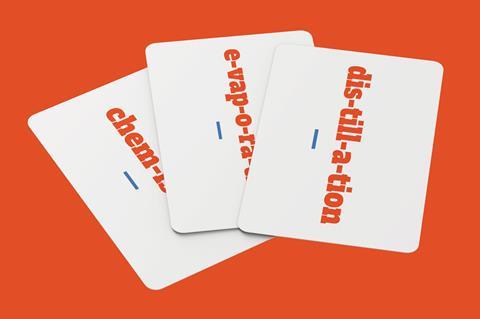Teaching students the language of science equips them to learn chemistry
In my experience students often start secondary school full of enthusiasm for science but as each year passes their enthusiasm wanes. Many students tell me it’s because they just can’t remember it all, or because science is really hard.
To my mind, students find science hard because to learn the facts, knowledge and skills, they first need to learn the language of science. To gain a deeper understanding of science, students need to be able to read fluently and write articulately about science. That means as teachers we need to impart the necessary language. Or as Wellington and Osborne put it in their 2001 book, Language and literacy in science education: ‘science educators are also to some extent language teachers and … the learning of science is like learning a whole new language.’

It came as no shock to me to read in the Education Endowment Foundation’s Review of SES and science learning in formal educational settings that evidence from correlational studies of science learning shows the strongest and most consistent predictor of students’ attainment in science education is how literate they are. If you don’t have a good grasp of the language of science, your progress will be limited.
Like many of my fellow science teachers, over the years I have seen a large number of fantastic whole school schemes to improve the literacy of students. The most successful whole school strategy I have used has been drop everything and read (DEAR). I use DEAR as an opportunity to read science texts, maybe an interesting article like Reversible superglue mimics snail slime from Science in the news for students. However, all too often initiatives for the whole school are led by English teachers and with the best will in the world, getting your maths team to write Point, evidence, explanation (PEE) paragraphs might not be the best way to improve a student’s literacy in maths.
When I was asked to be on the advisory panel for the EEF’s Improving literacy in secondary schools report, because in his words, ‘literacy is sometimes perceived, wrongly, as ‘for English teachers’, but we want to quash this misnomer’, I jumped at the chance.
This report is a game changer. It opens up the discussion that a student’s proficiency in literacy and language are fundamental to accessing all areas of the curriculum. It is no longer the preserve of the English department and essay-based subjects and most importantly it highlights the need for disciplinary literacy – the idea that literacy and text are specialised, and even unique, across the disciplines. The report provides a simple framework for teachers to look at literacy and language through the lens of their individual subjects.
Putting it into practice
The Improving literacy in secondary schools report includes seven recommendations and the first two of those I’ve looked at in detail with my team. I chose to start with these two as the first recommendation allows us to explore and discuss the ‘why’ and the second allows us to gain a greater understanding of the language of science, plus it’s an area we’re targeting in our school.
The first recommendation – Prioritise ‘disciplinary literacy’ across the curriculum – gives a good overview of why literacy is important in all subjects. I’ve edited the series of questions at the end of the recommendation to start the conversation on why literacy is important in science with my team, as well as in CPD sessions with other school – and recommend you use them too. For example:
- What is unique about science in terms of reading, writing, speaking and listening?
- Are there words and phrases used typically, or uniquely, in science?
- What is common in science and other subject disciplines?
- Are there any typical literacy misconceptions held by students (and teachers) in science?
- How do you and members of your team use language on a daily basis?
The second recommendation – Provide targeted vocabulary instruction in every subject – is my favourite aspect of science. It looks at the ‘science’ of language and discusses morphology and etymology, with suggestions that link strategies for use in the classroom. Using this recommendation, we have changed our practice in all science lessons. Students now have to not only learn keywords, but also their roots, origins and pronunciation – in fact, we make them chant them in class.
I love walking down the science corridor to hear Miss A in M5 getting year 8 to chant out loud ‘dis-till-a-tion’, quickly followed by 30 voices chanting back at her. ‘No, girls,’ says Miss A, ‘let’s do it again properly, louder.’ Oh dear what have I started?









No comments yet